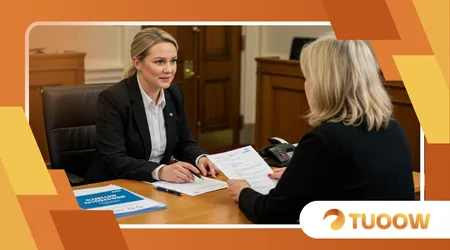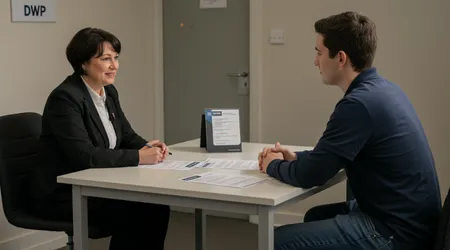What Happens During a DWP Compliance Interview?

During a DWP compliance interview, you might feel a mix of nerves and curiosity about what lies ahead. The Department for Work and Pensions (DWP) in the UK conducts these interviews to ensure benefit claims align with claimants’ current circumstances.
Far from being a punitive measure, these meetings aim to verify details, prevent errors, and maintain the integrity of the welfare system.
With roughly 23.7 million people receiving benefits like Universal Credit, State Pension, or Personal Independence Payment (PIP) in 2025, according to GOV.UK, compliance checks are routine yet vital.
This article demystifies the process, offering clear, practical insights to help you prepare confidently and navigate the experience with ease.
We’ll explore why these interviews happen, what to expect, how to prepare, and what follows, ensuring you’re equipped with actionable knowledge.
Navigating a compliance interview can feel like stepping into uncharted territory, but understanding its purpose transforms anxiety into preparedness.
Whether triggered by a random check or a reported change in circumstances, the process is designed to confirm that your benefits reflect your reality.
With rising living costs and evolving regulations in 2025, staying informed is crucial. Let’s dive into the intricacies of during a DWP compliance interview, unpacking each stage with real-world examples and expert tips to empower you.
Why Does the DWP Conduct Compliance Interviews?
The DWP’s mission is to ensure benefits reach those who need them while preventing fraud or errors. Compliance interviews act as a safeguard, verifying claim accuracy.
They’re not about catching you out but about keeping records current. Random audits, changes in income, or anonymous tips can prompt these checks.
Consider Sarah, a single mother on Universal Credit. A routine review flagged a discrepancy in her reported income, triggering an interview.
During a DWP compliance interview, officers clarified her part-time job details, ensuring her payments were correct. Such cases highlight the system’s focus on fairness.
++ Student Finance and Benefits: Can You Get Both?
In 2025, the DWP’s emphasis on data matching cross-referencing tax records or employment data has intensified.
This ensures claims align with reality, reducing overpayments. Interviews may also stem from life changes, like moving house or starting a job.
The process isn’t accusatory. It’s like updating your bank details after a move routine but essential. Compliance checks protect both claimants and the system, ensuring funds are distributed accurately.

What to Expect During a DWP Compliance Interview
During a DWP compliance interview, expect a structured yet conversational meeting, either by phone, at a Jobcentre, or at home.
A compliance officer leads, asking targeted questions about your circumstances. They’ll verify details like income, living arrangements, or health conditions affecting your claim.
Picture John, a PIP claimant with a chronic illness. During a DWP compliance interview, he was asked about recent medical changes.
He provided updated doctor’s letters, which streamlined the process. Officers aim to gather facts, not intimidate.
Questions can feel probing but are designed to confirm details. You might be asked about wages, rent, or who lives with you.
Also read: Free School Meal Expansion: What Families Should Know
The tone is professional, not adversarial. Officers may request documents like payslips or tenancy agreements to cross-check information.
The interview isn’t under caution unlike fraud investigations so you’re not accused of wrongdoing. It’s a fact-finding mission, lasting 20-40 minutes, depending on complexity. Staying calm and truthful is key to a smooth experience.
Expect follow-up questions if discrepancies arise. Officers may revisit unclear answers or request additional evidence. The process is thorough but not hostile, aiming to resolve issues efficiently.
How to Prepare for a DWP Compliance Interview
Preparation is your best ally for a compliance interview. Gather documents like bank statements, payslips, or medical records relevant to your claim. Review your benefit application to ensure consistency in your answers.
Take Emma, who faced a compliance check after moving. She brought her tenancy agreement and utility bills to her interview.
During a DWP compliance interview, these documents clarified her new address, avoiding delays. Preparation builds confidence.
Know your rights. You can bring a friend or advisor for support, especially if mental health issues make interviews challenging. The Citizens Advice Bureau offers free guidance if needed.
Practice answering questions about your income or living situation. Honesty is critical misleading answers can lead to benefit adjustments or investigations. Check the DWP’s letter for specific reasons for the interview.
Read more: DWP Payment Dates for Summer 2025: Full Schedule
Mental preparation matters too. Treat the interview like a doctor’s appointment routine but important. Jot down key points about recent changes to avoid forgetting details under pressure.
What Happens After the Interview?
Once during a DWP compliance interview concludes, the officer compiles a report summarizing findings. This report determines if your benefits continue unchanged, adjust, or require repayment. Outcomes vary based on the information provided.
For instance, Mark, a Universal Credit claimant, disclosed a new job during a DWP compliance interview. His benefits were adjusted to reflect his income, avoiding overpayment issues. Most cases resolve without further action if details align.
If discrepancies are found, the DWP may request additional documents or schedule a follow-up.
In rare cases, serious mismatches could lead to a fraud investigation, though this isn’t the norm. GOV.UK notes that compliance checks primarily aim to correct errors, not punish.
You’ll receive a written outcome, detailing any changes to your benefits. Keep these records for reference. If you disagree with the decision, you can appeal through the DWP’s complaints process.
Appeals must be lodged within one month, so act promptly. Legal advice can strengthen your case if you feel the outcome is unfair. The process ensures transparency and accountability.
Common Questions Asked During a DWP Compliance Interview
The questions posed during a DWP compliance interview focus on verifying your claim’s accuracy. Below is a table of common questions and why they’re asked, based on DWP guidance:
| Question | Purpose |
|---|---|
| What is your current income? | To confirm wages, pensions, or other income match DWP records. |
| Who do you live with? | To verify household composition and its impact on benefit eligibility. |
| Has your health condition changed? | To assess if medical conditions affecting benefits have altered. |
| What are your rent/mortgage details? | To ensure housing costs reported are accurate. |
| Have you started new employment? | To check if work status affects benefit entitlement. |
These questions ensure your claim reflects reality. Officers may ask follow-ups if answers raise concerns. Providing clear, honest responses prevents complications.
Anticipating questions reduces stress. If claiming PIP, expect queries about daily living challenges. For Universal Credit, income and savings are key focus areas.
Always back up answers with evidence. A payslip or medical letter can clarify doubts instantly, streamlining the process and avoiding delays.
Practical Tips for a Successful Interview

Success during a DWP compliance interview hinges on preparation and composure. Arrive on time, whether in-person or by phone, to set a positive tone. Dress appropriately for in-person meetings to show respect for the process.
Bring all requested documents, organized for easy access. If unsure about a question, ask for clarification rather than guessing. Honesty prevents future complications.
Consider recording the call (with permission) or taking notes for phone interviews. This ensures you have a record of what was discussed, useful for appeals.
If anxiety is a concern, inform the officer. They can adjust the pace or allow breaks. Support from a friend or advisor can ease nerves.
After the interview, follow up promptly if additional documents are requested. Quick responses demonstrate cooperation and can expedite outcomes.
Why Compliance Interviews Matter in 2025
In 2025, compliance interviews are more critical than ever. With economic pressures and policy changes, like the Universal Credit Bill’s updates, the DWP is tightening oversight. These checks ensure funds support those genuinely eligible.
The rise in data-sharing with HMRC and other agencies means discrepancies are flagged faster. Compliance interviews bridge gaps, preventing costly overpayments or underpayments.
Think of these interviews as a car MOT routine maintenance to keep things running smoothly. They protect claimants from unintended errors and maintain system trust.
Public perception often paints these interviews as intimidating, but they’re a procedural necessity. Understanding their role reframes them as opportunities to correct records.
As digital systems evolve, interviews may increasingly shift online, but their purpose remains: ensuring fairness. Staying proactive keeps you ahead in this process.
Frequently Asked Questions
Q: Is a compliance interview a fraud investigation?
No, it’s a routine check to verify claim details, not an accusation of fraud. Fraud investigations involve interviews under caution, which are distinct.
Q: Can I refuse to attend a compliance interview?
You can, but it may lead to benefit suspension or further scrutiny. Cooperation is advised to maintain claim accuracy.
Q: What if I can’t provide all documents?
Explain why during the interview and offer to submit them later. Transparency helps avoid misunderstandings.
Q: How long does the process take after the interview?
Outcomes are typically communicated within weeks, depending on case complexity. Follow-ups may extend this timeline.
Q: Can I bring someone to the interview?
Yes, a friend, family member, or advisor can attend for support, especially if you have health or anxiety concerns.
This guide aims to empower you with clarity and confidence. During a DWP compliance interview, preparation and honesty are your best tools.
Why worry when you can walk in ready? By understanding the process, gathering evidence, and staying calm, you’ll navigate it smoothly.
Stay informed, stay proactive, and ensure your benefits reflect your reality in 2025’s evolving landscape.
